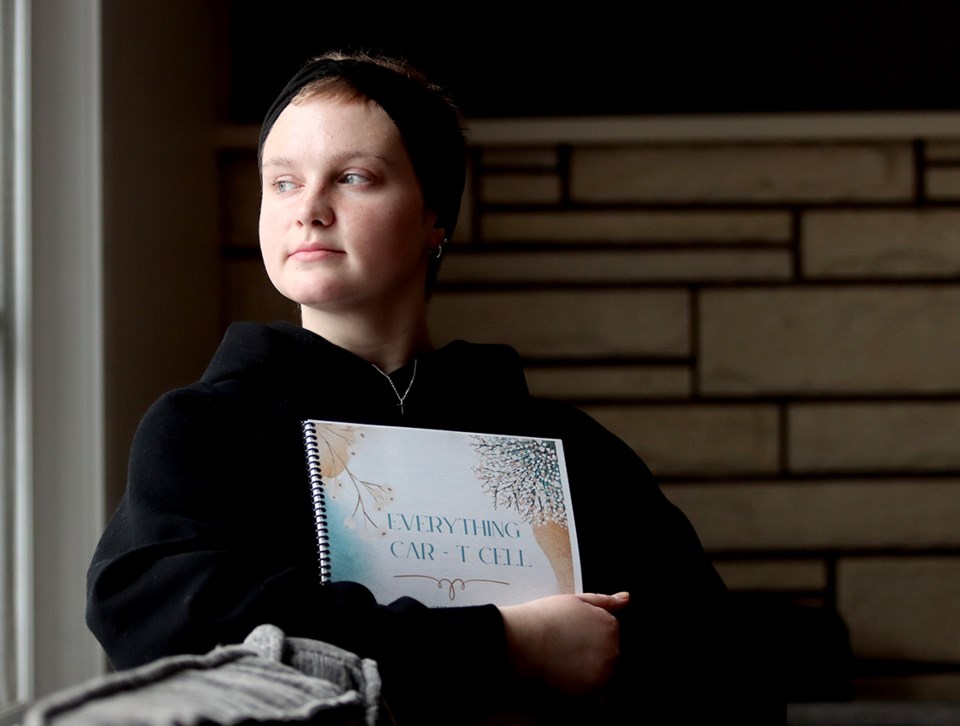A Coquitlam student who’s endured cancer three times is hoping some of her darkest moments will help light the way for other young people going through a similar health challenge.
Julia Dawson, a Grade 12 student at Dr. Charles Best Secondary School, has created a workbook for cancer patients and their families embarking upon Car T-cell therapy to treat their disease.
It’s a new regimen that uses a patient’s own T-cells to identify and destroy cancer cells with the help of genetic engineering.
Dawson had already beaten leukemia twice when doctors determined her third round with the disease was resistant to conventional chemotherapy.
Instead, they recommended removing T-cells — a type of white blood cell that fights infection — from Dawson’s body and retraining them to attack cancer cells before reinjecting them back into her bloodstream.
While Car T-cell therapy has been in clinical trials at Seattle Children’s Hospital since 2018, it was still new at BC Children’s Hospital.
Dawson would be among its first candidates for the procedure. She said she didn’t know much about the unique therapy going in. Nor did her family, and the all the research they did on the internet just turned up highly technical articles from medical journals. Even her doctors weren’t quite sure what to expect for things like side or long-term effects.
“There was not a lot of resources,” said Dawson. “I was scared, but the doctors were optimistic.”
To remove her T-cells, Dawson was hooked up for four hours to a large device that “looked like a washing machine” by a tube inserted in her neck. Several weeks later the engineered cells were reinjected through a port in her chest. Then she had to stay in isolation in the hospital for a month rebuilding her immune system.
During that time, Dawson said she asked the nurses and doctors a lot of questions. She made notes of how she was feeling, the fevers and loss of memory and occasional anger and fear she endured.
Dawson said the experience was “like going through a bad flu.”
But she also knew what she was experiencing could be invaluable to someone else about to undergo the same treatment asking the same questions she’d had.
“I want to make sure others have the information so they don’t feel totally alone,” Dawson said.
Back at school and feeling better, Dawson pitched the idea of the workbook as her senior year Capstone project. It includes pages with information about the Car T-cell therapy, its side effects and symptoms, a pain chart and various activity exercises to help manage feelings of anger and frustration.
Dawson said she vetted the more clinical elements of the workbook with her doctors and nurses to ensure the information was accurate.
She said putting it together helped ease her own journey
“It really helps by just putting it into words,” Dawson said, adding it also kept her positive and hopeful. “You realize things you’re going through are normal.”
Dawson said she prepared workbooks for youth counsellors at Camp Goodtimes, a special summer camp for young people living with cancer. BC Children’s is also including copies in a special welcome package for new Car T-cell patients and the hospital is in the process of securing grants to print more copies and distribute them to other institutions across Canada offering the therapy.
Dawson said the project has fuelled her determination to pursue a career in health care that begins when she heads to Simon Fraser University next fall to study health sciences.
“I want to help others know it’s going to be OK.”
📣 Got an opinion on this story or any others in the Tri-Cities? Send us a letter or email your thoughts or story tips to [email protected].
📲 Want to stay updated on Coquitlam, Port Coquitlam, Port Moody, Anmore and Belcarra news? Sign up for our free daily newsletter.
💬 Words missing in an article? Your adblocker might be preventing hyperlinked text from appearing.



